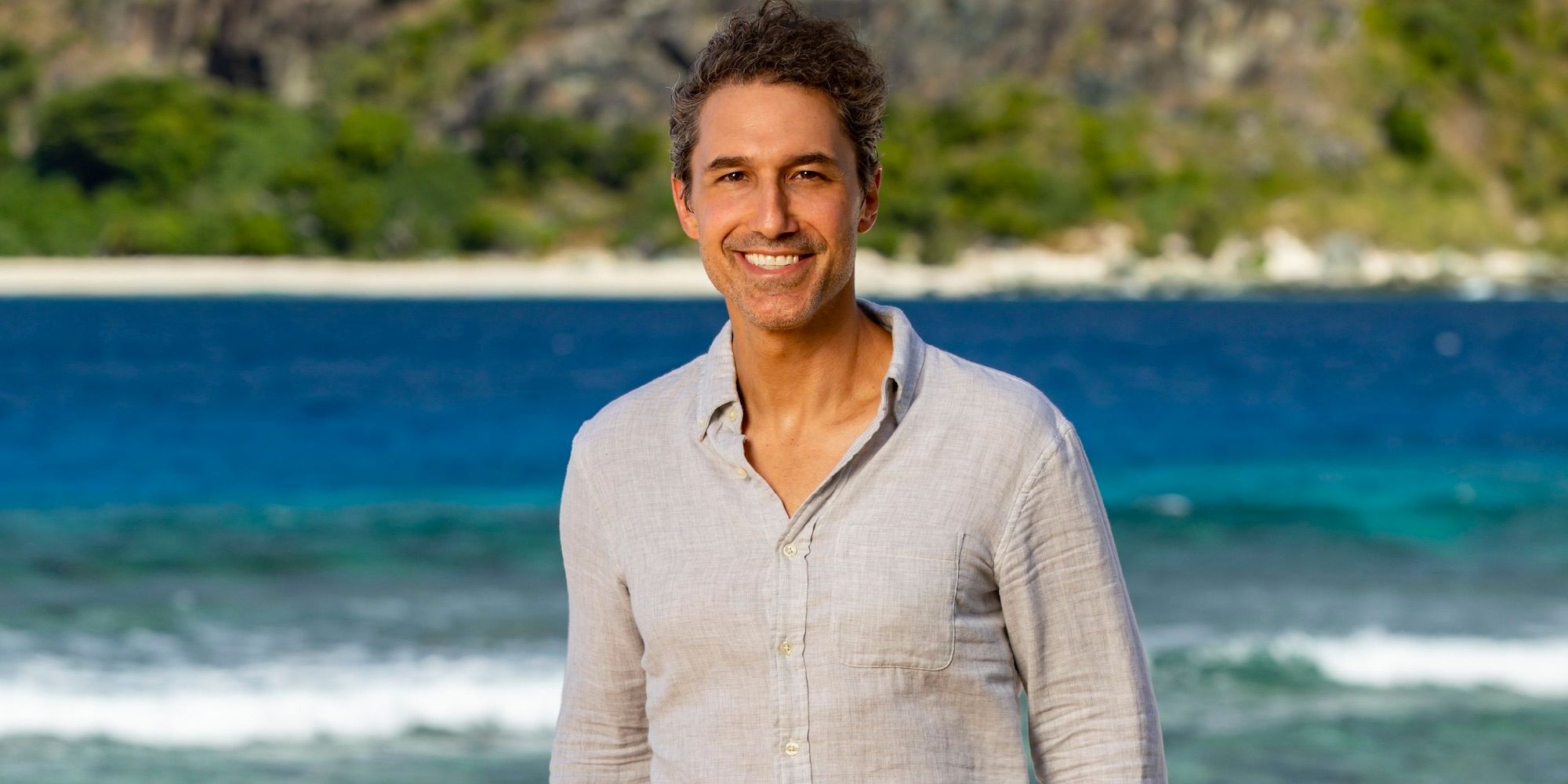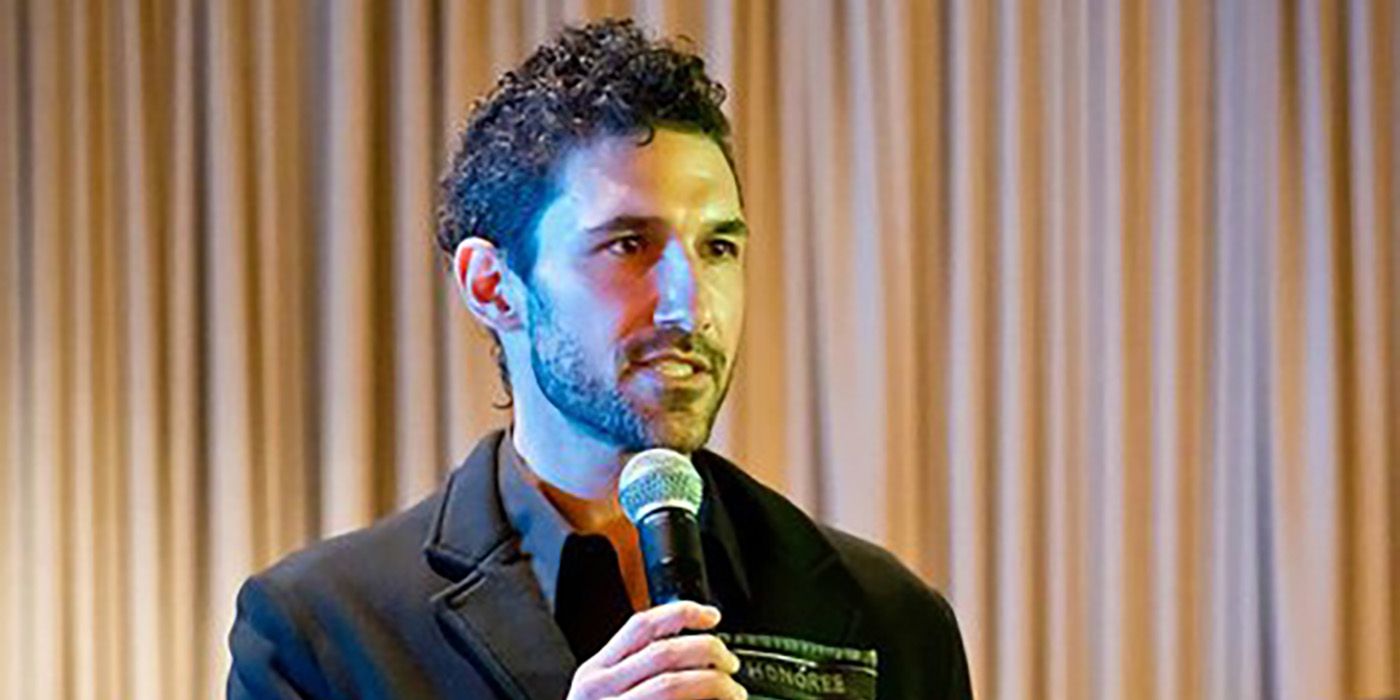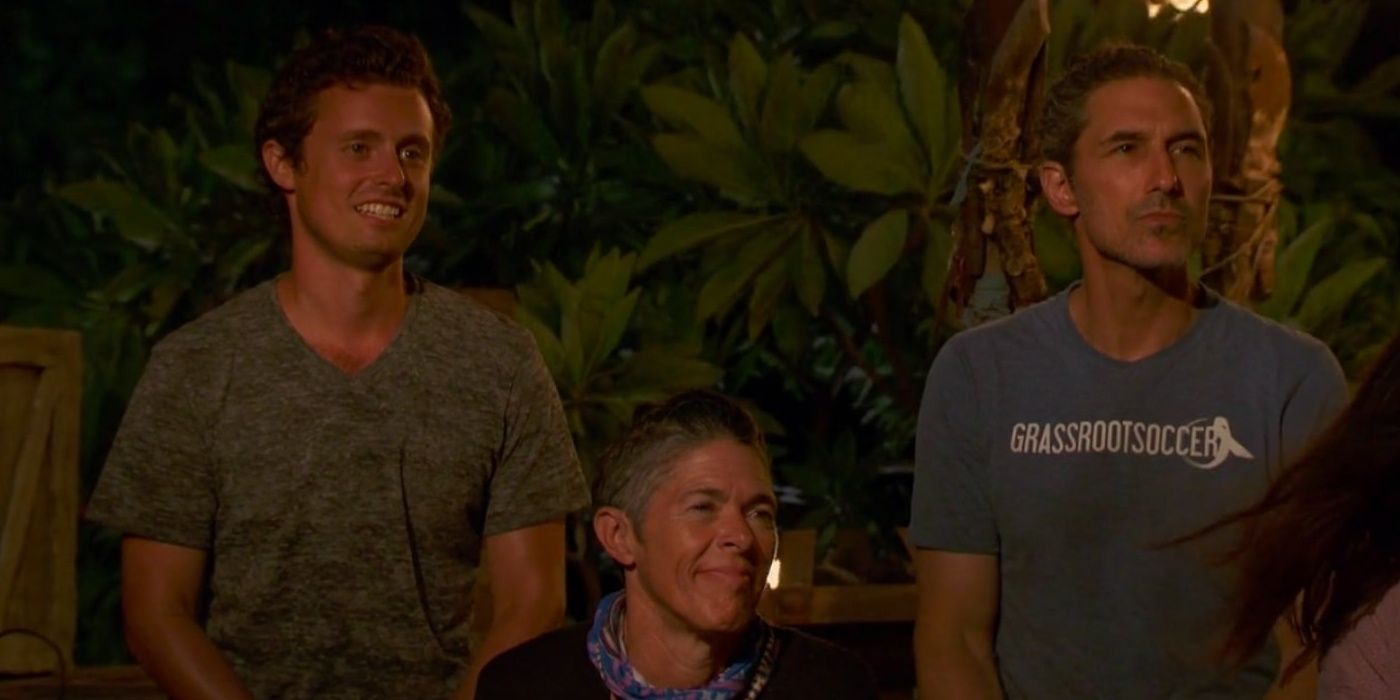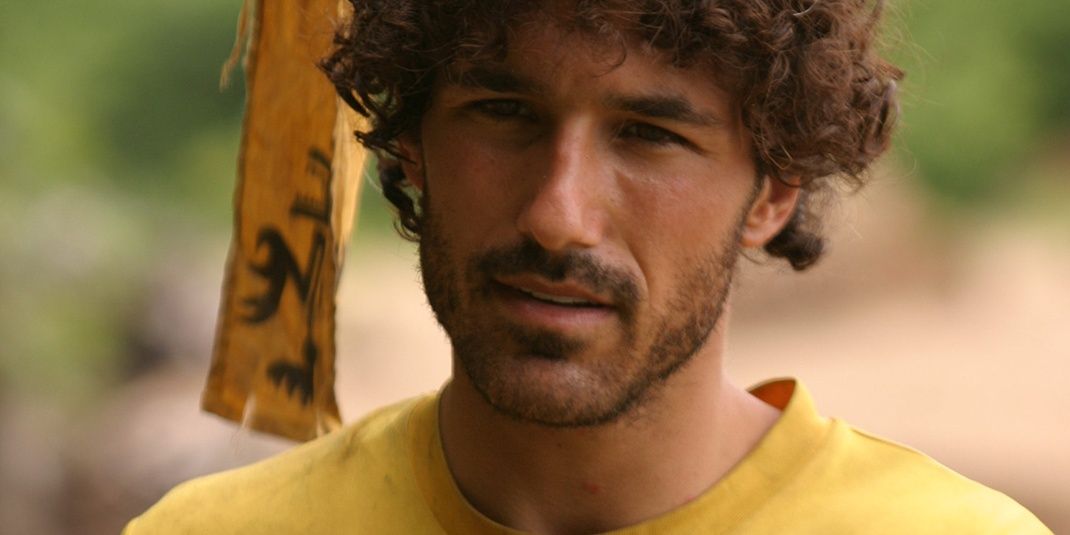At the fourth tribal council of Winners at War, Jeff Probst turned to Ethan Zohn, probing for his thoughts on the most recent analogy used to explain the social dynamics of the game: bunkers.
Ethan: “I don’t know much about bunkers. I just want to get through this vote. This is the most important moment for me right now, and I’ve got to play right now.”
Jeff: “So does that mean that you don’t really think that much ahead?”
Ethan: “I do. I do, but I can’t think too far ahead if I’m not in the game anymore.”
For years, Ethan fought to keep his metaphorical torch alit as he battled and beat Hodgkin’s lymphoma, and then spent the following years wrestling with the fear that the winds of fate would threaten his flame once more. He was consumed by these anxieties.“What if the cancer comes back? What if I never get married? What if I lose my job?” Pernicious thoughts led to deleterious decisions, until Ethan developed a strategy for living without constantly peering over his shoulder for bad news. He made a list of everything he would do if the cancer he rid himself of in 2013 returned. He filed it away, just in case.
“So now, all of a sudden,” Ethan said, “it’s out of my head. It’s on paper. I have a plan in place, and I don’t need to spend every second of every day ruminating on these what-if scenarios.”
During tribal council, as Ethan’s tribe members contemplated the implications of their bunker-hopping, the former professional soccer player was singularly focused on the vote. He couldn’t worry about how the lines would be redrawn when he returned to camp because this is the way he lives his life. Ethan knows he's not guaranteed tomorrow. The only time he knew he had was the moments before Jeff pulled the final vote out of the urn. To the chagrin of Survivor fans around the world, the last vote read "Ethan." The only solace in his abrupt departure was realizing that no one is as equipped as Ethan to handle the next phase of the game. Though he'd been taken out in devastating fashion by an insurgent coalition that aimed to cut down power players Adam Klein and Boston Rob, Ethan walked into this familiar arena undeterred, triumphantly stating, “I’m not afraid of Edge of Extinction."
Ethan spoke with Screen Rant this week to discuss everything from dying to living to the secret behind his strange ability to regurgitate food on command:
Screen Rant: Ethan it's a pleasure to be able to talk to you. Describe to me the moment you learned you were in consideration for season 40 and what that felt like.
Ethan Zohn: I was sitting on my couch eating Doritos in the middle of the woods in New Hampshire because that's where my wife and I moved to when we left New York City a few years ago. We moved to New Hampshire and I was just living my life (laughs) and knowing that there's something like this maybe happening. But still, when I got that call, oh my God. I was excited. Nervous. Panicking. I need a crash course in getting myself back in shape again, but overall just joy and excitement. Thrilled to be on the list of people coming back. You get the call to see if you’re interested and then you wait around a while to see if you get the call to say if you’re on the show. In the meantime, being in limbo is an interesting place to live, but once I got the call, I was all in. One hundred percent in. My wife and I left New Hampshire because I can’t train in a frozen lake. We moved south so I could be outside and train outside and do whatever I needed to do to get ready for Survivor and I just dove right in, no pun intended, to get myself mentally and physically and spiritually ready to go out and play Survivor and take on everything this game puts in your head.
You've been through quite the journey since your last time on Survivor. What was the biggest thing you thought you needed to do to prepare yourself, either physically or mentally?
Since my time on Survivor, yeah I’ve been through some stuff. But I’ve collected a nice tool kit on how to keep myself sane in this world. I’ve got my wife, my two cats. I’ve got cannabis (laughs). I’ve got food and water and shelter. What I was most nervous about was leaving all that behind, going out there without…they showed this on TV, for me, getting through cancer is tough, but the after parts of cancer is what was really difficult for me. I definitely faced some certain levels of anxiety and fears of my cancer coming back and that’s caused some things to happen in my life. So I definitely, definitely got my routine.
Were you nervous going back out there?
This is what Survivor is all about. Take yourself out of what you feel comfortable with, plop you down in the middle of, basically, 20 strangers and you have to make friendships with these people. Friendships based on trust. You can’t trust anyone. I don’t have all my meds, the food and the water, so I was nervous about all this stuff, nervous of how I would able to put myself in the context of when I was 27 years old. Part of this for me was, my wife and I, we went back and watched Survivor: Africa before I went out there, because I just wanted to see, who was this person that played? What did other people think of him? How did I present myself to the world? And I thought, "You have no idea what’s about to come your way, kid." That whole thing, but just, I was a different person. You know? The game was so different, so now, it wasn’t better or worse. It’s just different now, so I had to definitely get ready to battle in this type of environment where it now has blindsides and idols and clues and ways to get back in the game and a currency now all of a sudden, you’re playing for 2 million dollars, so all of that…it’s a lot! It’s a lot to catch up on (laughs).
How was getting ready for this experience different than All-Stars?
The first All-Stars, there were winners and non-winners, so instantly, people were ganging up on people that had won the show before. In a good way, that wasn’t the situation here. Everyone coming into this is a winner, so that was kind of nice. I was kind of concerned. There were some big names out there: Parvati, Boston Rob. And I just didn’t know how I would respond to these people having been away from the game for so long and there’s this little old-school new-school thing going on, where, you know, just to see where I fit in. I think my advantage is, no one may remember how I played the game. It was so long ago, and there were none of these added clues or whatever, incentives or twists back in the day. No one really knew - or knows - how I will play the game and I think that’s an advantage. To be really underestimated in my gameplay and strategy was definitely a benefit coming into this season.
You've talked about the difficulties of life after cancer. How have you dealt with the fear of cancer returning?
I live with this every day. This is something that any cancer survivor deals with on a daily basis. If a doctor tells you to do something or you’ll die, you do it. It’s pretty easy. You’ve got to take this or you’ll die. But it’s the things after, like facing your life when your whole life is ahead of you. As a pediatric patient, your parents take care of you. As an older adult, you might be married, or you have a job, cool. It’s kind of the end of your life. Now, you’ve got to figure out how to live a life when you don’t even know what your future looks like, so I was definitely living in this world of destructive decisions and thoughts. You’re on a hamster wheel of anxiety and fear. So basically, what I did, we created a little bit of a strategy on how to deal with fear and that’s basically, I would face these problems head on. I would say, okay, the cancer’s going to come back and I would write a list of things to do when - if - the cancer came back…I do this in my regular life as well. I call it the what-if scenario, so what if the cancer comes back? What if I never get married? What if I lose my job? All this stuff that you are afraid about when you’re surviving cancer. And then I would literally take out a piece of paper and write it down. If the cancer comes back, tell my mom, "I’m going to have to go through chemo.” All this s**t. I would file that away. So now, all of a sudden, it’s out of my head. It’s on paper. I have a plan in place, and I don’t need to spend every second of every day ruminating on these what-if scenarios. And I felt like if you had to live through something once, you shouldn’t have to make yourself live through it twice, multiple times a day. It’s just a bad way to live. And so I tried to bring that philosophy out there on Survivor. You can’t live in these fearful thoughts. Face them head on, make a plan for it and put it away because then you just end up wasting days if you just, frickin’, I could get hit by a car tomorrow, but if I spent every second of every day obsessing over the fact that I may get hit by a car, it’s a horrible way to live.
Did you carry any of that fear with you when you left to go on Survivor for a third time?
I didn’t want to go in playing this inspiration. I knew cancer would be a part of my story, and it’s clearly what they’re pushing forward now. But listen, that was seven years ago. We’re all winners. We’re all here to play. My cancer definitely shouldn’t be part of my game, however now you see CBS is definitely choosing to show that as part of my story. So was I scared? Yeah. But I’m a competitor. I’m an athlete. I know how to pick myself up after failing, whether that’s in a soccer game or with cancer. Part of that is having resiliency, so I really wasn’t afraid of going out there and playing. I just didn’t know how I would react in that situation because it’s been so long and I’ve been through so much.
What has it been like getting to watch yourself on the show? (Editor's note: I asked Ethan this two days before we watched him get voted out.)
It’s been a little bit liberating. For me, getting to Day 1 was a win. No one really understands what I’ve had to go through to get to a place where I could play this game. But putting that aside, now that I am playing the game, this deleted scene, I had a couple different objectives going out there. Yes, I want to play and win and do my best on Survivor. But also to achieve some life moments and things that it’s worth to appreciate. I said it, and I’ll repeat it again, but a sunset, sunrise, catching a fish, watching the stars, being outside, meeting new people, winning a challenge, blindsides, all these things you can achieve in the game without winning the game were huge momentous moments for me. I was trying to compartmentalize the game in a way where I had my whole, Ethan Playing The Game Of Survivor, but then Ethan Let’s Accomplish Some Life Goals as well and I believe in that. I think that’s important for any player going out there because we all know, 20 players are asked to play. There’s only going to be one person that’s going to win, right? And there’s 19 losers (laughs). All of us know that going into it, so how can you win at the game without winning the game? Or if you do win the game and then win at this stuff, even better. So I think that was a good way to rationalize the experience on Survivor.
Speaking of deleted scenes, can you explain your ability to regurgitate food whenever you want?
(Laughs) I was the youngest of three brothers. There may have been a time of my life where I wanted to draw some extra attention to myself, so I had a whole arsenal of stupid human tricks that I did that I may or may not be revealing. One is regurgitating food. I have other ones where I can put a string up my nose and pull it out my mouth. I can make parts of my body squeak. I have all these weird stupid human tricks that I ... (enters falsetto) I just keep tucked away to bring a little humor and levity to the situation. But I liked when Rob said, I could just regurgitate the idol (makes regurgitating noise), here Jeff I have an idol.
If that happens, it’s going to go down in history.
I think so, right.
There were several deleted scenes about you I wish could have made the show.
When I first played there was less going on in the game in terms of gameplay, strategy, idols, all that stuff. There was more time to show characters and who they are as human beings. At its core, Survivor is a game of people. It’s humans. Interactions. Relationships. A little bit, because there’s so much going on, you don’t have as many of those moments anymore. And those are the moments I feel the audience responds to and why you get hooked in and why you identify with certain people at certain times. It’s like, “Oh my God! I would have done that same thing.” Or, “No way that guy is a jerk!” So when they show these human moments like Parvati teaching me how to lie or regurgitating food or having these life moments, it’s just, I don’t know. It’s an editing choice and it’s fine either way. But a little of that has been lost.
Had you kept in touch with any of the Survivors before going out there?
I did not try to reach out to anyone. Parvati and I are friends outside the game, so we were in touch. But other than that, I hadn’t talked to Rob since when he was on The Amazing Race. Whenever that was. I kind of fell off the face of the map when I got sick. I was watching Heroes vs. Villains getting a stem cell transplant when that was on. So that was a whole thing. I stopped going to the events. I wasn’t that involved. I haven’t kept in touch with people for 10, 12 years.
What would Ethan Zohn be doing right now if he was never cast on Survivor: Africa?
I’d probably be still involved with soccer. Still coaching. I probably would’ve still done work with Grassroot Soccer. I just don’t think we would’ve been able to get to where we are now without my involvement. The final tribal council of Survivor: Africa, Lex said, “What are you going to do if you win that money?” I sat there right there on the spot. I hadn’t eaten in frickin’ 39 days. I smelled like a giraffe. I said, “I’m going to use this money start a charity, using kids and soccer.” And so, when I got off the show, that’s exactly what I did. So I feel like I would’ve gravitated towards using soccer to help people in the world. I just don’t know if it would have been as big and huge as Grassroot Soccer if it wasn’t for Survivor because obviously I had the platform and the money to start it. And then, Survivor: All-Stars, I wore my Grassroot Soccer yellow shirt. One thousand kids. Fifty countries. Graduated 2.3 million kids from the program. I wore the shirt again on Survivor. People don’t realize that the show is not only creating fans around the world, which is awesome. Twenty-six countries it's airing in now. But it’s also saving lives. Grassroot soccer has saved the lives of literally 2.3 million kids and I think that’s because of Survivor and with the whole cancer thing, in 2009 when I was first diagnosed, Jenn Lyon, another contestant from Survivor: Palau, we were both facing cancer together. She had breast cancer. I had lymphoma. She ended up passing away. But we started Survivor: Stand Up To Cancer, which is a partnership between Survivor and Stand Up To Cancer, where we auctioned off all the props from the show on eBay to raise money for cancer research. So now, all of a sudden, we’re creating that whole movement. So if you think Survivor has an impact on this world, which it does, another level is all the lives they’ve saved because of the show. And I’m just an example. Every contestant who’s ever been on the show, in a way, has tried to use this show as a platform to help others. I think that’s an underrated outcome of this television show that’s been on the air for 20 years.
What has it been like being in the spotlight again?
I’ve been overwhelmed at the response to the show. The 40th season, 20th year. But the response to the fact that I’m back on the show has been really nice and comforting and I think everyone - it’s hard to talk about yourself without sounding completely self-serving and conceited - but I was a little bit surprised at some of the responses. It’s great. People are sending me really nice stuff. Incredible messages on Instagram, so just hearing me talk about being a cancer survivor and the struggles I went through has helped some other people out there, so that’s just really nice. That’s why you do stuff like this.
Is there one message you've received that sticks out the most?
I’m stage 3 lymphoma. I’m about to get my second stem cell transplant and I just saw you on Survivor and I was ready to toss in the towel and now I have hope. You’ve given me hope. There is life after cancer. I can’t tell you the number of messages I’ve gotten like that since the show premiered a few weeks ago. It’s in the 30s. I’m keeping track of all of them because it’s just nice to read. You never really have that opportunity to get that instant feedback like you do now in a world with social media and to understand that, I don’t know, the details of my life helps someone out there. Helping other people get diagnosed early or handle their cancer care, that’s my proudest accomplishment to be honest. Survivor is great. Winning Survivor is awesome, but really being able to make a difference like that is head and shoulders above anything else this show will ever bring me.
Survivor airs Wednesdays at 8pm on CBS.




